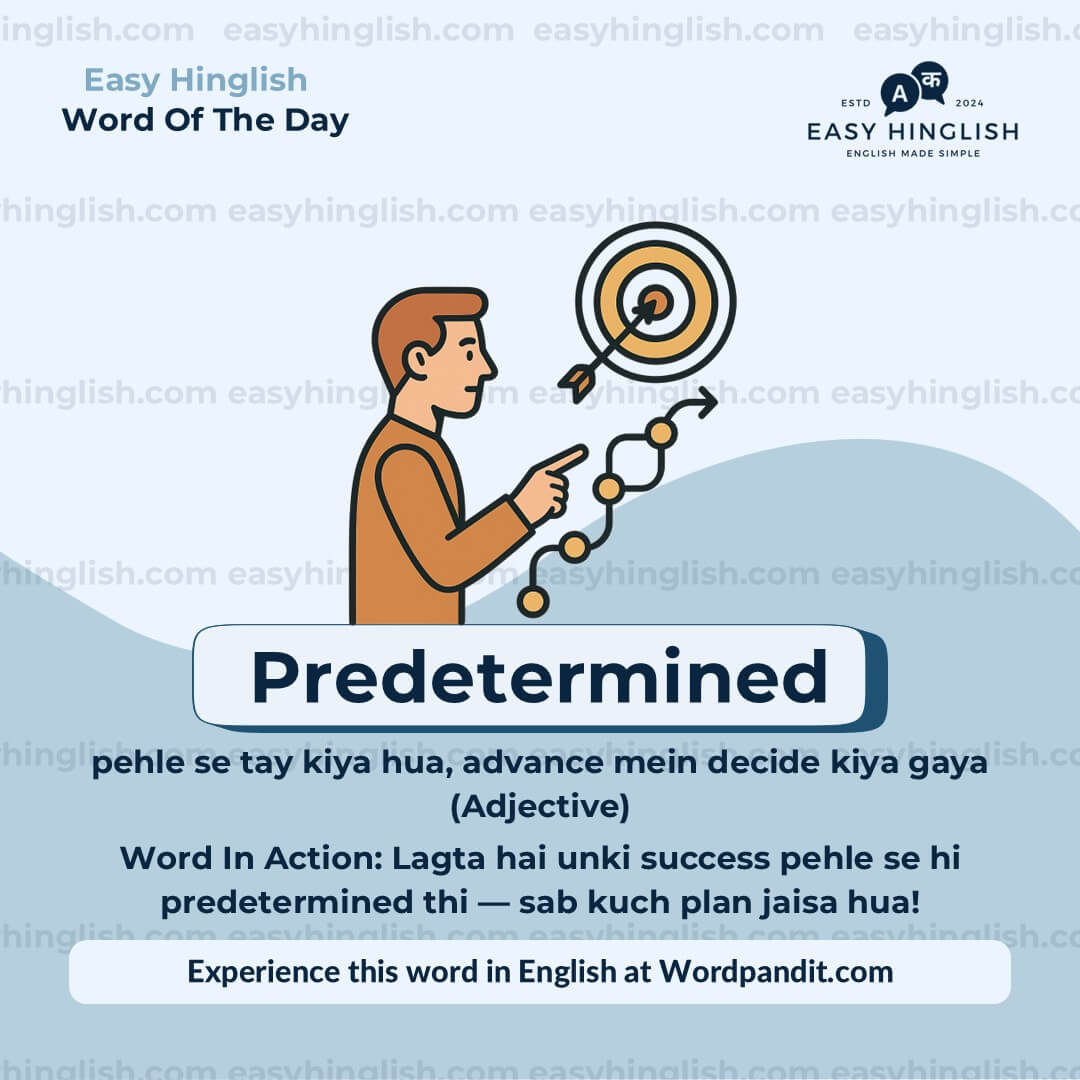Daily Vocabulary International Newspapers aur Publications se Seekho
Wordpandit ke Global Vocabulary Hub ke Saath Apni Vocabulary Expand Karo
Wordpandit par, hum aapko ek truly global vocabulary develop karne me madad karte hain, jo duniya ke sabse respected international publications se li gayi hoti hai. Yeh section aapko naye words se introduce karne ke liye design kiya gaya hai jo global conversations aur trends ko define karte hain.
Global Sources ka Power
Aapko globally sochne aur communicate karne me madad dene ke liye, hum vocabulary curate karte hain world ke top international sources se, jaise:
- The New York Times
- The Washington Post
- BBC
- The Guardian
- The Economist
- Scientific American
- Psychology Today
- Aur bhi bahut saare...
Globally Socho, Competitively Seekho
Hamare daily updates se aap international publications ke naye words seekhoge jo global news aur developments se jude hote hain. Isse aapki vocabulary current bhi rahegi aur globally relevant bhi.
Apni Global Soch Ko Expand Karo
Agar aap international exams ki tayari kar rahe ho, global business communication me excel karna chahte ho, ya sirf apni language skills improve karna chahte ho, toh Wordpandit aapko global level pe grow karne ke liye best resources provide karta hai.
Smart Learning, Global Reach
Hamari learning methodology me global examples, memory aids, aur interactive activities shamil hain, jo naye words ko effectively yaad karne aur real-world me use karne me madad karti hain.
Aaj Hi Apni Global Vocabulary Journey Shuru Karo!
Wordpandit Kyun Choose Karein?
Practical Learning: Aise words seekho jo real-world reading aur communication me aapko sach me kaam aayenge, taaki aapki comprehension aur bolne ki skills improve ho.
Diverse Content: Current affairs se lekar scientific breakthroughs tak, hamare different sources aapko multiple domains ki vocabulary seekhne ka moka dete hain.
Effortless Integration: Wordpandit ko apni daily routine ka part banao. Sirf kuch minute har din dene se aapki vocabulary time ke saath kaafi improve ho sakti hai.
Vocabulary Mastery Tak Ka Aapka Safar
- Regularly hamare Daily Vocabulary section ko visit karo
- Naye words explore karo aur unka context me use samjho
- In words ko apni writing aur bolne ki practice me use karne ki koshish karo
- Jaise-jaise aapke words badhte hain, apni progress ko track karo
Aaj Hi Apni Vocabulary Journey Shuru Karo!
Wordpandit ke saath vocabulary improve karna start karo. Roz thoda effort dalne se aap ek strong vocabulary develop kar sakte ho jo academic, professional, aur personal life me kaafi kaam aayegi.
Yaad rakho, ek naya shabd roz seekhna linguistic limitations ko door karne ka best tareeka hai! Wordpandit ko apni daily learning journey ka sathi banao aur vocabulary excellence ki taraf badho!
WORD-1: Predetermined
Sandarbh (Context):
"...each form is predetermined to devolve into the next..." - The Republic Analysis Article
Vyakhya (Explanatory Paragraph):
Predetermined ka matlab hai 'pehle se hi tay karna ya decide karna, kisi cheez ke hone se pehle uska outcome ya sequence fix kar dena.' Yeh word tab use hota hai jab koi event, result ya pattern spontaneous nahi balki pre-established plan ya natural order follow karta hai. Predetermined ko formal writing, scientific discussions, philosophical texts aur competitive exam passages jaise CAT aur GRE mein use karte hain jab events, results ya patterns ki baat ho jo pehle se fixed hote hain.
Arth (Meaning): pehle se tay kiya hua, advance mein decide kiya gaya (Adjective)
Uccharan (Pronunciation): pree-dih-TUR-mind (प्रीडिटर्मिंड)
Kathinai Star (Difficulty Level): ⭐⭐ Basic se Intermediate
Utpatti (Etymology): Predetermined word prefix 'pre-' (matlab 'pehle') aur 'determined' (Latin 'determinare' se aaya jiska matlab hai 'boundaries ya limits set karna') se mila hai. Yeh word 17th century ke around English mein aaya, mainly philosophical aur theological discussions mein fate aur free will ke baare mein, aur baad mein expand hoke kisi bhi advance mein fixed outcome ya condition ko describe karne laga.
Prashant Sir Ke Tathya (Prashant Sir's Notes):
Students aksar poochhte hain: predetermined aur predestined mein kya farak hai? Dono ka matlab hai kuch advance mein decide hua, lekin 'predetermined' neutral hai aur scientific, logical ya planned sequences ke liye use hota hai, jabki 'predestined' mein spiritual ya fate-related feeling hoti hai. CAT aur GRE ke students ke liye, predetermined aksar RC passages mein scientific processes, evolutionary patterns ya structured systems ke context mein dikhta hai. Predetermined ka sahi istemal kaise karein: yeh typically 'outcome,' 'path,' 'sequence,' ya 'conclusion' jaise nouns ko modify karta hai. Indian newspapers mein aapko predetermined aksar political analysis mein milega—jaise "election result predetermined lagta tha"—ya bureaucratic processes ki discussion mein jahan decisions public consultation se pehle hi le liye jaate hain.
Samanarthi & Vipritarthi (Synonyms & Antonyms):
Samanarthi (Synonyms): prearranged, preordained, fixed, preset, foreordained, predestined, pehle se tay, advance mein decide kiya hua, preestablished, planned ahead
Vipritarthi (Antonyms): spontaneous, random, unpredictable, impromptu, unplanned, undecided
Udaharan (Usage Examples):
- IPL match ka outcome predetermined lag raha tha jab Mumbai Indians ne chase ke pehle five overs mein apne top three batsmen kho diye.
- Rohan ko shak tha ki interview results predetermined the kyunki company ne already informally ek internal candidate ko position offer kar di thi.
- Government office ki bureaucratic process ek predetermined sequence of approvals follow karti hai jo simple business license applications mein bhi months add kar deti hai.
- Bahut saare joint families mein, career paths aksar predetermined lagte hain parental expectations se rather than individual interests aur talents se.
Sanskritik Sandarbh (Cultural Reference):
"Karma ka philosophy suggest karta hai ki consequences hamare actions se predetermined hote hain, lekin humein un actions ko choose karne ki freedom rehti hai." - Indian spiritual discourse mein common interpretation
Sochiye (Think About It):
Kya aapko lagta hai ki life ke major outcomes circumstances se predetermined hote hain, ya phir individual choices sach mein hamari destiny shape karti hain? Ek duniya mein jahan social, economic aur family conditions predetermined hain, wahan free will kahan se shuru hoti hai?
Chhoti Kriya (Quick Activity):
Apni daily life mein teen situations identify karein jahan outcomes predetermined lagte hain—shayad exam seat numbers, queue positions, ya meeting agendas. Har ek ke baare mein ek sentence likhein jismein 'predetermined' sahi tarike se use ho.
Yaad Karne Ka Tarika (Memory Tip):
'Predetermined' ko aise yaad rakhein: 'PRE-DETERMINED'—imagine karo ek cricket match jahan DETERMINATION (result) match start hone se PEHLE (pre) hi ho gaya tha. Ek fixed match picture karo jahan sabko pehle se winner pata hai—that's predetermined!
Vastavik Jeevan Me Upyog (Real-World Application):
Predetermined commonly scientific writing mein use hota hai fixed sequences ya outcomes describe karne ke liye experiments, evolutionary biology aur systems analysis mein. Business contexts mein, yeh project management discussions mein predetermined milestones ke baare mein aur legal documents mein predetermined penalties ya conditions describe karne ke liye dikhta hai. Competitive exam essays aur RC passages ke liye, 'predetermined' samajhna aapko arguments identify karne mein madad karta hai jo causality, inevitability aur structure-agency ke beech tension ke baare mein hote hain social, biological ya mechanical systems mein.
WORD-2: Unmoored
Sandarbh (Context):
"The democratic man himself is generous... but unmoored." - The Republic Analysis Article
Vyakhya (Explanatory Paragraph):
Unmoored ka matlab hai 'bina kishor ke, bina anchor ke; stability, direction ya firm principles ka na hona.' Yeh word tab use hota hai jab koi cheez ya koi insaan apni anchor ya foundational connection kho chuka ho aur bina guidance ya fixed purpose ke drift kar raha ho. Unmoored ko literary writing, psychological discussions, philosophical texts aur competitive exam passages jaise CAT, GRE aur UPSC mein use karte hain emotional states, social conditions ya aise individuals describe karne ke liye jo values, relationships ya beliefs mein stable grounding nahi rakhte.
Arth (Meaning): bina anchor ke, stability ya direction ka na hona (Adjective)
Uccharan (Pronunciation): un-MOORD (अनमूर्ड)
Kathinai Star (Difficulty Level): ⭐⭐⭐ Intermediate
Utpatti (Etymology): Unmoored nautical term 'moored' se aaya hai, jo Middle English 'moren' aur Middle Dutch 'maren' se derive hua hai jiska matlab hai 'boat ko tie ya fasten karna.' Prefix 'un-' isko negate karta hai, jo image create karta hai ek boat ki jo apne anchor se toot kar bina control ke drift kar rahi hai. 19th century tak, yeh word metaphorically expand ho gaya psychological aur philosophical states of disconnection aur instability describe karne ke liye.
Prashant Sir Ke Tathya (Prashant Sir's Notes):
Bahut students unmoored ko unmotivated ya directionless se confuse karte hain, lekin unmoored specifically suggest karta hai ki kuch anchored tha jo ab loose ho gaya hai—yahan lost stability ka sense hai rather than kabhi direction nahi tha. Unmoored aur adrift mein kya farak hai? Dono lacking direction suggest karte hain, lekin unmoored ka usage previous stability se breaking away emphasize karta hai, jabki adrift zyada neutral hai. UPSC aur CAT ke students ke liye, unmoored aksar passages mein modern society, identity crises ya philosophical discussions about values mein dikhta hai. Indian newspapers ki editorials mein aapko aksar "feeling unmoored" milega rapid social change, migration experiences ya traditional family structures chhod kar urban independence ke psychological impact ke baare mein.
Samanarthi & Vipritarthi (Synonyms & Antonyms):
Samanarthi (Synonyms): adrift, untethered, unanchored, rootless, unstable, directionless, ungrounded, disconnected, floating, detached, bhatakta hua, jad se katta
Vipritarthi (Antonyms): anchored, grounded, stable, rooted, secure, fixed, settled, sthir, mazboot
Udaharan (Usage Examples):
- Bangalore ke startup mein job kho dene ke baad, Arjun completely unmoored feel kar raha tha, apne career choices aur life direction par sawaal utha raha tha.
- Pandemic ne bahut saare students ko unmoored feel karaya kyunki school, coaching classes aur friendships ki familiar routines achanak gayab ho gayin.
- Meera ka decision apne family ki traditional business se alag hone ka use financially independent bana gaya lekin emotionally unmoored kar gaya generations ki legacy se.
- Novel ka protagonist Delhi ki streets mein bhatakta hai, apne village roots se unmoored lekin city mein bhi belonging dhoondhne mein asamarth.
Sanskritik Sandarbh (Cultural Reference):
"Film 'Zindagi Na Milegi Dobara' mein, teen dost initially apne true selves se unmoored hain, sirf societal expectations se anchored hain jab tak unki Spanish journey unhe authentic living se reconnect nahi karati." - Common film analysis interpretation
Sochiye (Think About It):
Aaj ke rapidly changing India mein, jahan young professionals aksar opportunities ke liye relocate karte hain, kya family aur tradition se unmoored feel karna ambition aur growth ki inevitable price hai, ya hum modern aspirations pursue karte hue bhi anchored rehne ke tarike dhoonkh sakte hain?
Chhoti Kriya (Quick Activity):
Teen situations ke baare mein sochiye jahan log unmoored feel kar sakte hain—shayad graduation ke baad, job transitions mein, ya cities move karne par. In mein se kisi ek ke baare mein ek sentence likhiye jismein 'unmoored' use karke lost stability ka sense capture ho.
Yaad Karne Ka Tarika (Memory Tip):
'Unmoored' ko aise yaad rakhein: 'UN-MOORED'—imagine karo ek boat jiski MOORING rope UNDONE ho gayi hai, ab freely bina direction ke float kar rahi hai. Kerala ke backwaters mein ek houseboat picture karo jo apne anchor se toot kar aimlessly drift kar rahi hai—that's being unmoored!
Vastavik Jeevan Me Upyog (Real-World Application):
Unmoored commonly literary criticism, psychology articles aur philosophical essays mein use hota hai emotional ya existential states of disconnection describe karne ke liye. Journalistic writing mein, yeh feature stories mein dikhta hai migration, identity crises aur social transformation ke baare mein. Competitive exam essays aur reading comprehension passages ke liye, 'unmoored' samajhna aapko characters ki psychological states analyze karne mein madad karta hai, societal commentary about rapid change aur tradition-modernity ke beech tension ke arguments samajhne mein, jo UPSC essay papers aur CAT RC passages mein human conditions explore karne ke liye particularly valuable hai.
WORD-3: Licentious
Sandarbh (Context):
"...the youth who become licentious by a law forbidding them to spend and waste..." - The Republic Analysis Article
Vyakhya (Explanatory Paragraph):
Licentious ka matlab hai 'naitik roop se belaagam, legal ya ethical restraints ka na hona, khaaskar sexual conduct ya indulgent behavior mein.' Yeh word tab use hota hai jab log ya behaviors accepted moral standards ko ignore karke excessive pleasure ya freedom pursue karte hain bina self-control ke. Licentious ko literary criticism, historical texts, philosophical discussions aur competitive exam passages jaise CAT, GRE aur UPSC mein use karte hain characters, societies ya behaviors describe karne ke liye jo moral excess aur lack of discipline se characterized hote hain.
Arth (Meaning): naitik roop se belaagam, indulgent, proper limits ka na hona (Adjective)
Uccharan (Pronunciation): ly-SEN-shus (लाइसेन्शस)
Kathinai Star (Difficulty Level): ⭐⭐⭐⭐ Advanced
Utpatti (Etymology): Licentious Latin word 'licentia' se aaya hai jiska matlab hai 'freedom' ya 'license,' jo 'licere' se derive hua hai matlab 'permitted hona.' Jabki 'license' initially legitimate freedom mean karta tha, 'licentious' 16th century mein evolve hua specifically excessive freedom describe karne ke liye jo moral disorder mein cross kar jaata hai. Yeh word yeh idea carry karta hai ki bahut zyada freedom bina restraint ke corruption aur indulgence ki taraf le jaata hai, permission ko moral abandonment mein transform kar deta hai.
Prashant Sir Ke Tathya (Prashant Sir's Notes):
Bahut students licentious ko promiscuous se confuse karte hain, lekin ek important distinction hai: promiscuous specifically sexual behavior refer karta hai, jabki licentious ka upyog broader moral indulgence encompass karta hai including excess in pleasure, disregard for rules aur general lack of self-control. Licentious aur libertine mein kya farak hai? Libertine aksar philosophical rejection of morality imply karta hai, jabki licentious simply unrestrained behavior describe karta hai. CAT aur GRE ke students ke liye, licentious aksar RC passages mein dikhta hai historical periods, social criticism ya literature mein character analysis ke baare mein. Indian newspapers ki opinion pieces mein aapko kabhi-kabhi licentious milega political ya corporate excess criticize karte waqt, though writers aksar contemporary contexts ke liye softer terms prefer karte hain jaise "indulgent" ya "unrestrained."
Samanarthi & Vipritarthi (Synonyms & Antonyms):
Samanarthi (Synonyms): dissolute, debauched, immoral, unrestrained, promiscuous, libertine, wanton, dissipated, profligate, lascivious, ayyash, belaagam, chanchal
Vipritarthi (Antonyms): moral, virtuous, restrained, disciplined, chaste, proper, principled, naitik, sanyami, sheel
Udaharan (Usage Examples):
- Historical novel mein kuch Mughal courtiers ki licentious lifestyle dikhaayi gayi jo excessive luxury mein indulge karte the jabki empire external threats face kar rahi thi.
- Critics ne argue kiya ki film ne licentious behavior ko glorify kiya rather than use moral decline ke baare mein ek cautionary tale ke roop mein present karna.
- Reformer ki speeches ne condemn kiya jo woh urban elite ke licentious attitudes kehte the jo traditional values ignore karke material pleasure pursue karte the.
- Sharma ki grandmother aksar complain karti thi ki modern society bahut licentious ho gayi hai, young people boundaries ya propriety ke liye koi respect nahi dikhate.
Sanskritik Sandarbh (Cultural Reference):
"'Devdas' mein Devdas ka character sirf romantic nahi balki licentious portrayed hai apne self-destructive pursuit of pleasure through alcohol mein, ultimately unrestrained passion ke consequences represent karta hai." - Film analysis perspective
Sochiye (Think About It):
Society ko personal freedom aur moral responsibility ke beech line kahan draw karni chahiye? Kya jo ek generation licentious behavior kehti hai woh simply next generation ki individual liberty aur choice ki definition hai?
Chhoti Kriya (Quick Activity):
Do sentences likhiye jismein alag-alag historical ya fictional characters compare karein—ek jo restraint exercise karta ho aur ek jo licentiously jeeta ho. Explore kariye ki unke choices kaise different outcomes ki taraf le gayin.
Yaad Karne Ka Tarika (Memory Tip):
'Licentious' ko aise yaad rakhein: 'LICENSE-ious'—imagine karo koi jo apna LICENSE (freedom) BAHUT ZYADA far le jaata hai, saari moral boundaries cross kar leta hai. Picture karo ek driving license holder jo sochta hai license ka matlab hai koi rules apply nahi hote—har jagah recklessly drive karna. Woh excessive, rule-breaking freedom hai licentious behavior!
Vastavik Jeevan Me Upyog (Real-World Application):
Licentious commonly literary analysis mein use hota hai character flaws discuss karte waqt, historical writing mein decadent periods ya corrupt societies describe karte waqt, aur social commentary mein moral decline critique karte waqt. Competitive exam essays ke liye, particularly UPSC ethics papers aur CAT reading comprehension, 'licentious' samajhna aapko arguments analyze karne mein madad karta hai freedom versus responsibility, individual rights versus social order, aur unchecked indulgence ke consequences ke baare mein. Yeh word frequently passages mein dikhta hai ancient civilizations, Renaissance courts ya modern debates about cultural values aur personal liberty discuss karte waqt.
WORD-4: Appetites
Sandarbh (Context):
"Democracy unchains the appetite of the oligarchic man..." - The Republic Analysis Article
Vyakhya (Explanatory Paragraph):
Appetites ka matlab hai 'natural desires ya cravings, khaaskar food, pleasure ya physical aur emotional needs ki satisfaction ke liye.' Yeh word tab use hota hai jab human drives aur urges describe karte hain jo behavior ko motivate karte hain, ranging from basic biological needs se lekar deeper psychological desires for power, wealth ya pleasure tak. Appetites ko philosophical texts, psychological discussions, nutritional contexts aur competitive exam passages jaise CAT, GRE aur UPSC mein use karte hain human motivation, self-control aur desire-reason ke beech tension explore karne ke liye.
Arth (Meaning): physical ya emotional needs ki satisfaction ke liye natural desires ya cravings (Noun, plural)
Uccharan (Pronunciation): AP-uh-tyts (ऐपिटाइट्स)
Kathinai Star (Difficulty Level): ⭐⭐ Basic se Intermediate
Utpatti (Etymology): Appetites Latin word 'appetitus' se aaya hai jiska matlab hai 'desire' ya 'longing,' jo 'appetere' se derive hua hai matlab 'seek after karna' ya 'strive for karna.' Root 'ad-' (toward) aur 'petere' (to seek) ko combine karta hai. 14th century mein originally primarily hunger aur physical cravings ke liye use hota tha, gradually word expand hua sabhi forms of desire encompass karne ke liye—basic needs for food se lekar complex yearnings for power, knowledge ya pleasure tak, jo isse human nature ke philosophical discussions ke liye central bana deta hai.
Prashant Sir Ke Tathya (Prashant Sir's Notes):
Students aksar poochhte hain: appetites aur desires mein kya farak hai? Jabki dono kuch chahne ko refer karte hain, appetites specifically natural, aksar physical cravings suggest karta hai jo bodily ya instinctual needs se arise hote hain, jabki desires purely mental ya abstract ho sakte hain. Appetites ka sahi istemal kaise karein: philosophical contexts mein jaise diye gaye example mein, yeh aksar plural hota hai aur human cravings ki full range ko refer karta hai—sirf hunger nahi. UPSC essay aur CAT RC passages ke liye, appetites frequently discussions mein dikhta hai self-control, governance, human nature aur morality ke baare mein. Indian newspapers mein aapko phrases milenge jaise "political appetites," "consumer appetites," ya "appetites for growth"—word metaphorically extend hota hai kisi bhi strong craving ya ambition ke liye beyond just food.
Samanarthi & Vipritarthi (Synonyms & Antonyms):
Samanarthi (Synonyms): desires, cravings, hungers, yearnings, urges, longings, wants, inclinations, thirsts, lusts, ichchhayen, lalasayen, bhookh
Vipritarthi (Antonyms): aversion, distaste, disinterest, apathy, satiation, satisfaction, repulsion, ghrina, triptata, asantushtata
Udaharan (Usage Examples):
- Festival season ne sabke appetites for sweets ko awaken kar diya, Delhi mein mithai shops morning se night tak long queues witness kar rahi thi.
- Corporate leaders ko apne appetites for growth ko balance karna chahiye ethical responsibilities ke saath employees aur society ke prati.
- Ravi ke appetites sirf food se beyond the—woh knowledge, travel experiences aur diverse log ke saath meaningful conversations crave karta tha.
- 1990s ki economic reforms ne Indian consumers ke appetites unleash kar diye international brands aur luxury goods ke liye jo previously market mein unavailable the.
Sanskritik Sandarbh (Cultural Reference):
"Bhagavad Gita mein, Krishna Arjuna ko apne appetites aur desires control karne par advice dete hain, sikhate hain ki cravings par mastery inner peace aur spiritual clarity ki taraf le jaati hai." - Gita ki teachings on self-control ki common interpretation
Sochiye (Think About It):
Consumer-driven society mein jahan unlimited choices aur constant advertising hai, individuals kaise distinguish kar sakte hain genuine appetites jo satisfaction need karti hain aur manufactured desires jo marketing aur social pressure create karti hai ke beech?
Chhoti Kriya (Quick Activity):
Teen different types of appetites list kariye jo humans experience karte hain—physical, emotional aur intellectual. Har ek ke liye ek sentence likhiye, dikhate hue ki yeh different appetites kaise behavior ko different ways mein drive karti hain.
Yaad Karne Ka Tarika (Memory Tip):
'Appetites' ko aise yaad rakhein: 'APPE-TITES'—imagine karo aapka stomach aur mind dono desire ke different APPS (applications) se TIED hain. Jaise food apps aapko hungry banate hain, waise hi different life situations different appetites activate karte hain—hunger app, ambition app, pleasure app. Yeh saari cravings hain aapki appetites!
Vastavik Jeevan Me Upyog (Real-World Application):
Appetites commonly nutritional aur health writing mein use hota hai eating habits aur physical cravings discuss karte waqt, business journalism mein market demand aur consumer behavior describe karte waqt, aur philosophical ya political writing mein human motivation aur governance explore karte waqt. Competitive exam essays ke liye, particularly UPSC ethics aur CAT reading comprehension, 'appetites' samajhna aapko arguments analyze karne mein madad karta hai self-control, human behavior mein desire ka role, consumer culture aur satisfying needs-maintaining discipline ke beech philosophical tension ke baare mein. Yeh word frequently passages mein dikhta hai psychology, economics, political philosophy aur social commentary discuss karte waqt.
WORD-5: Posited
Sandarbh (Context):
"These regimes can be observed in isolation, but they are also posited as a linear progression..." - The Republic Analysis Article
Vyakhya (Explanatory Paragraph):
Posited ka matlab hai 'kisi idea ya theory ko fact ya reasoning ke basis ke roop mein put forward karna; kisi cheez ko theory ya explanation ke roop mein propose karna.' Yeh word tab use hota hai jab koi idea, theory ya assumption ko further argument ya discussion ke foundation ke roop mein present karta hai, bina necessarily pehle prove kiye. Posited ko academic writing, philosophical texts, scientific papers aur competitive exam passages jaise CAT, GRE aur UPSC mein use karte hain yeh indicate karne ke liye ki koi concept ya framework analysis ya debate ke starting point ke roop mein proposed kiya gaya hai.
Arth (Meaning): argument ke basis ke roop mein put forward karna; true maan kar propose karna (Verb, past tense)
Uccharan (Pronunciation): PAH-zih-ted (पॉज़िटेड)
Kathinai Star (Difficulty Level): ⭐⭐⭐ Intermediate
Utpatti (Etymology): Posited Latin 'positus' se aaya hai, jo 'ponere' ka past participle hai jiska matlab hai 'place karna' ya 'put karna.' Yeh word English mein medieval philosophical Latin 'positum' ke through aaya, jo kisi cheez ko premise ke roop mein laid down ya established karne ko refer karta tha. Academic discourse mein, yeh evolve ho gaya kisi cheez ko axiom ya starting assumption ke roop mein propose karne ka matlab, intellectually ek idea ko consideration ke liye table par "place" karne ki act emphasize karta hai rather than empirically prove karna.
Prashant Sir Ke Tathya (Prashant Sir's Notes):
Bahut students posited ko proven ya stated se confuse karte hain, lekin ek crucial distinction hai: posited specifically kisi cheez ko theoretical foundation ke roop mein propose karna mean karta hai bina necessarily abhi evidence ke. Posited aur hypothesized mein kya farak hai? Hypothesized scientific method mein testable proposition suggest karta hai, jabki posited ka usage broader hai aur philosophy, social sciences aur theoretical frameworks mein dikhta hai. CAT aur GRE ke students ke liye, posited aksar RC passages mein theories, models aur conceptual frameworks ke baare mein dikhta hai—yeh signal karta hai ki jo follow karta hai woh proposed explanation hai rather than established fact. Indian academic writing aur newspaper editorials mein aapko phrases milenge jaise "the theory posits that" ya "economists have posited"—yeh sophisticated tarika hai kehne ka "someone has suggested this idea as a starting point."
Samanarthi & Vipritarthi (Synonyms & Antonyms):
Samanarthi (Synonyms): proposed, postulated, assumed, hypothesized, theorized, suggested, advanced, put forward, asserted, presumed, prastav rakha, maan liya
Vipritarthi (Antonyms): disproved, refuted, rejected, questioned, challenged, denied, khandan kiya, nakara
Udaharan (Usage Examples):
- Economist ne posit kiya ki India ki demographic dividend agle do decades tak growth drive karegi, though critics ne kai underlying assumptions par question uthaye.
- Ancient Indian philosophers ne karma ke concept ko ek fundamental law ke roop mein posited kiya jo lifetimes across moral consequences govern karta hai.
- Research paper ne Bangalore ke working professionals ke beech social media usage aur anxiety levels ke direct correlation ko posited kiya.
- Historians ne Indus Valley Civilization ke decline ke baare mein various theories posited ki hain, climate change se lekar foreign invasions tak ranging.
Sanskritik Sandarbh (Cultural Reference):
"Einstein ne posit kiya ki time relative hai rather than absolute, fundamentally universe ko samajhne ka tarika change kar diya—ek theory jo impossible lagti thi jab tak experimental evidence ne confirm nahi kiya." - Science education mein common reference
Sochiye (Think About It):
Kitni beliefs jo hum success, happiness ya "right way to live" ke baare mein hold karte hain woh simply ideas hain jo society ya family tradition ne posited ki hain rather than truths jo humne personally examine aur test ki hain?
Chhoti Kriya (Quick Activity):
Indian society mein career, marriage ya success ke baare mein ek common assumption ke baare mein sochiye. Ek sentence likhiye jismein 'posited' use karke is assumption ko ek theory ke roop mein present karein jo questioned ya examined ho sakti hai.
Yaad Karne Ka Tarika (Memory Tip):
'Posited' ko aise yaad rakhein: 'POSITION-ed'—imagine karo koi chess piece ko board par apni opening move ke roop mein POSITION kar raha hai. Woh ek idea ko starting point ke roop mein table par PLACE kar rahe hain, abhi victory claim nahi kar rahe. Jaise chess opening ek strategy POSIT karti hai, waise hi academic arguments theories ko discussions ke foundations ke roop mein POSIT karte hain!
Vastavik Jeevan Me Upyog (Real-World Application):
Posited commonly academic writing mein sabhi disciplines mein use hota hai jab theories, models ya frameworks introduce karte hain, research papers mein jab hypotheses ya assumptions present karte hain, aur analytical essays mein jab proposed explanations discuss karte hain. Competitive exam essays aur reading comprehension ke liye, particularly UPSC mains aur CAT RC passages, 'posited' samajhna aapko identify karne mein madad karta hai ki authors kab theoretical frameworks present kar rahe hain versus established facts. Yeh critical thinking opportunities signal karta hai—jab bhi kuch posited hota hai, aapko us proposition ko support karne wale evidence aur logic evaluate karne chahiye rather than use proven truth ke roop mein accept karna.













